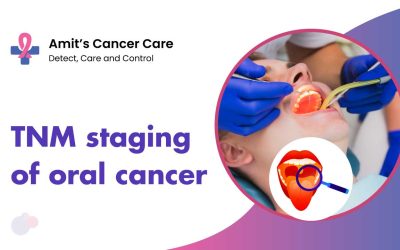Tongue cancer is a concerning diagnosis that affects many individuals worldwide. Being equipped with knowledge about Stage 1 tongue cancer, including its signs, symptoms, causes, and treatment options, is crucial for early detection and successful management.
In this comprehensive guide, we will explore the intricacies of Stage 1 tongue cancer, shedding light on its definition, risk factors, common signs and symptoms, methods of diagnosis, available treatment options, potential lifestyle changes, prevention strategies, and valuable resources for support.
What is Stage 1 Tongue Cancer?
Stage 1 tongue cancer refers to the initial stage of the disease, in which the tumour is localized and has not spread to nearby tissues or lymph nodes. This early stage presents an opportunity for a favorable prognosis, as early detection and intervention can significantly improve treatment outcomes.
Stage 1 tongue cancer typically involves a small tumour that measures less than 2 centimeters in diameter and is confined to the tongue’s surface. Successful treatment and preservation of speech and swallowing functions are likely at this stage.
Causes and Risk Factors
Understanding tongue cancer’s underlying causes and risk factors is essential for prevention and early detection.
Tobacco use, including smoking and smokeless tobacco products, is one of the primary risk factors for tongue cancer.
The chemicals in tobacco can damage the DNA in cells, leading to abnormal cell growth and cancerous tumors. Heavy alcohol consumption is another significant risk factor, especially when combined with tobacco use.
Other factors that may increase the risk of tongue cancer include human papillomavirus (HPV) infection, specific genetic syndromes, and a family history of oral cancers.
It is important to note that not all individuals with these risk factors will develop tongue cancer, and some individuals without these risk factors may still be diagnosed with the disease.
Signs and Symptoms
Recognising the signs and symptoms of Stage 1 tongue cancer is crucial for timely diagnosis and effective treatment.
Common indicators of tongue cancer include persistent mouth sores that do not heal within two weeks, red or white patches on the tongue or other mouth areas, unexplained bleeding or numbness, pain or difficulty swallowing, changes in speech or voice, and a persistent sore throat.
Some individuals may also experience ear pain or a feeling of something stuck in the throat. It is important to note that various other conditions can cause these symptoms.
Still, if they persist for more than two weeks or worsen over time, it is essential to consult an oncologist for further evaluation.
Diagnosis and Staging
Accurate diagnosis and staging of Stage 1 tongue cancer are vital for developing a personalized treatment plan. tongue cancer doctor in Mumbai will perform a thorough physical examination to diagnose tongue cancer and may order additional tests.
A biopsy, which involves removing a small tissue sample from the tongue for laboratory analysis, is typically performed to confirm the presence of cancer cells.
Imaging tests, such as X-rays, computed tomography (CT) scans, and magnetic resonance imaging (MRI) scans, may be conducted to determine the extent of the tumour and whether it has spread to nearby lymph nodes.
In some cases, a sentinel lymph node biopsy may be performed to assess the involvement of lymph nodes in the disease.
This comprehensive evaluation helps determine the cancer stage, which guides the selection of appropriate treatment options.
Treatment Options
Treatment options for Stage tongue cancer typically involve a multidisciplinary approach and aim to remove the tumour while preserving speech and swallowing functions. Treatment choice depends on various factors, including the size and location of the tumour, overall health status, and patient preferences.
Surgical interventions are commonly used and may include tumour resection, partial glossectomy (removal of part of the tongue), or laser surgery.
In some cases, neck dissection may be performed to remove lymph nodes affected by cancer cells. Radiation therapy, which uses high-energy beams to kill cancer cells, may be recommended as a primary treatment or in combination with surgery.
In certain instances, targeted therapy or chemotherapy may destroy cancer cells or slow their growth.
Each treatment modality has its benefits and potential side effects, which should be discussed with the oncologist to make an informed decision.
Support and Resources
A diagnosis of tongue cancer can be emotionally challenging, and support is essential throughout the treatment journey.
It is important to seek support from loved ones, friends, and family. Sharing your experience and feelings with them can provide emotional support and help alleviate the stress associated with the diagnosis.
In addition to personal support systems, numerous resources are available for individuals facing tongue cancer. Local and online support groups provide a platform for connecting with others who have gone through similar experiences.
These groups offer a safe space to share concerns, advice, and encouragement. Counseling services can also be beneficial in managing the emotional impact of the diagnosis and treatment process.
Several organizations and foundations are dedicated to supporting individuals with oral cancers, including tongue cancer.
The Oral Cancer Foundation is one such organization that provides valuable resources, educational materials, and information about support groups.
Local cancer centers and hospitals often have specialized support programs and services for individuals with tongue cancer. Tongue cancer surgeons in Mumbai can guide you in accessing these resources and connecting with others who have faced similar challenges.
Conclusion
Understanding the signs, symptoms, and treatment options for Stage 1 tongue cancer is paramount for early detection and successful management.
Individuals can take control of their oral health and overall well-being by being aware of the risk factors, recognising symptoms, seeking prompt medical attention, and incorporating preventive measures into daily routines.
Early intervention is critical, and support is available throughout the journey. Stay informed, be proactive, and consult an oncologist for personalized advice and guidance.
With knowledge and support, individuals can navigate the complexities of Stage 1 tongue cancer with confidence and resilience.






